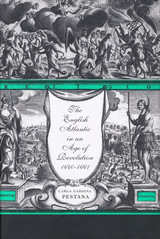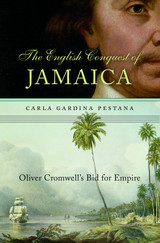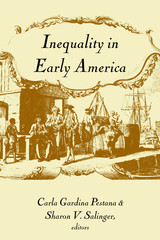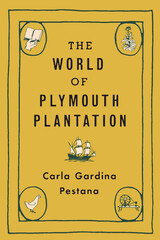
Between 1640 and 1660, England, Scotland, and Ireland faced civil war, invasion, religious radicalism, parliamentary rule, and the restoration of the monarchy. Carla Gardina Pestana offers a sweeping history that systematically connects these cataclysmic events and the development of the infant plantations from Newfoundland to Surinam.
By 1660, the English Atlantic emerged as religiously polarized, economically interconnected, socially exploitative, and ideologically anxious about its liberties. War increased both the proportion of unfree laborers and ethnic diversity in the settlements. Neglected by London, the colonies quickly developed trade networks, especially from seafaring New England, and entered the slave trade. Barbadian planters in particular moved decisively toward slavery as their premier labor system, leading the way toward its adoption elsewhere. When by the 1650s the governing authorities tried to impose their vision of an integrated empire, the colonists claimed the rights of "freeborn English men," making a bid for liberties that had enormous implications for the rise in both involuntary servitude and slavery. Changes at home politicized religion in the Atlantic world and introduced witchcraft prosecutions.
Pestana presents a compelling case for rethinking our assumptions about empire and colonialism and offers an invaluable look at the creation of the English Atlantic world.

In 1654, England’s Lord Protector Oliver Cromwell conceived a plan of breathtaking ambition: the conquest of Spain’s vast American empire. As the first phase of his Western Design, a large expedition sailed to the West Indies, under secret orders to take Spanish colonies. The English Conquest of Jamaica presents entrenched imperial fantasies confronting Caribbean realities. It captures the moment when the revolutionary English state first became a major player in the Atlantic arena.
Although capturing Jamaica was supposed to be only the first step in Cromwell’s scheme, even that relatively modest acquisition proved difficult. The English badly underestimated the myriad challenges they faced, starting with the unexpectedly fierce resistance offered by the Spanish and other residents who tenaciously defended their island. After sixteen long years Spain surrendered Jamaica and acceded to an English presence in the Americas in the 1670 Treaty of Madrid. But by then, other goals—including profit through commerce rather than further conquest—had superseded the vision behind the Western Design.
Carla Gardina Pestana situates Cromwell’s imperial project in the context of an emerging Atlantic empire as well as the religious strife and civil wars that defined seventeenth-century England. Though falling short of its goal, Cromwell’s plan nevertheless reshaped England’s Atlantic endeavors and the Caribbean region as a whole. Long before sugar and slaves made Jamaica Britain’s most valuable colony, its acquisition sparked conflicts with other European powers, opened vast tropical spaces to exploitation by the purportedly industrious English, and altered England’s engagement with the wider world.


An intimate look inside Plymouth Plantation that goes beyond familiar founding myths to portray real life in the settlement—the hard work, small joys, and deep connections to others beyond the shores of Cape Cod Bay.
The English settlement at Plymouth has usually been seen in isolation. Indeed, the colonists gain our admiration in part because we envision them arriving on a desolate, frozen shore, far from assistance and forced to endure a deadly first winter alone. Yet Plymouth was, from its first year, a place connected to other places. Going beyond the tales we learned from schoolbooks, Carla Gardina Pestana offers an illuminating account of life in Plymouth Plantation.
The colony was embedded in a network of trade and sociability. The Wampanoag, whose abandoned village the new arrivals used for their first settlement, were the first among many people the English encountered and upon whom they came to rely. The colonists interacted with fishermen, merchants, investors, and numerous others who passed through the region. Plymouth was thereby linked to England, Europe, the Caribbean, Virginia, the American interior, and the coastal ports of West Africa. Pestana also draws out many colorful stories—of stolen red stockings, a teenager playing with gunpowder aboard ship, the gift of a chicken hurried through the woods to a sickbed. These moments speak intimately of the early North American experience beyond familiar events like the first Thanksgiving.
On the 400th anniversary of the Mayflower landing and the establishment of the settlement, The World of Plymouth Plantation recovers the sense of real life there and sets the colony properly within global history.
READERS
Browse our collection.
PUBLISHERS
See BiblioVault's publisher services.
STUDENT SERVICES
Files for college accessibility offices.
UChicago Accessibility Resources
home | accessibility | search | about | contact us
BiblioVault ® 2001 - 2024
The University of Chicago Press









